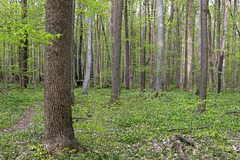RHH's photos with the keyword: cass county
Dowagiac Woods
| 05 Jun 2019 |
|
|
|
On our way home and as we left Michigan we visited Dowagiac Woods Nature Sanctuary in Cass County, Michigan. This is the description of the place on the website of the Michigan Nature Association: "Dowagiac Woods is the second largest MNA sanctuary in the Lower Peninsula. The name, pronounced “doe-WAH-jack”, originates from a Pottawatomi Indian word meaning a place where one could obtain all his food, clothing, and shelter. Minimally disturbed since its government patent in 1836, Dowagiac Woods remains true to its name and is regarded as a high quality example of southern mesic forest. Because the majority of the property has never been plowed or clear-cut, the forests serve as a living museum of how Michigan forests looked
prior to settlement. The larger size of the property is essential in maintaining the diversity of plant and animal life found here. A mixed matrix of floodplain, southern-mesic forest, and hardwood swamp allows for nearly 50 species of nesting birds and several of reptiles, such as the black rat snake." Another site mentions 400 species of plants and 45 different trees. In these photos the plants are mainly Skunk Cabbage and Trilliums.
Dowagiac Woods
| 05 Jun 2019 |
|
|
|
On our way home and as we left Michigan we visited Dowagiac Woods Nature Sanctuary in Cass County, Michigan. This is the description of the place on the website of the Michigan Nature Association: "Dowagiac Woods the second largest MNA sanctuary in the Lower Peninsula. The name, pronounced “doe-WAH-jack”, originates from a Pottawatomi Indian word meaning a place where one could obtain all his food, clothing, and shelter. Minimally disturbed since its government patent in 1836, Dowagiac Woods remains true to its name and is regarded as a high quality example of southern mesic forest. Because the majority of the property has never been plowed or clear-cut, the forests serve as a living museum of how Michigan forests looked
prior to settlement. The larger size of the property is essential in maintaining the diversity of plant and animal life found here. A mixed matrix of floodplain, southern-mesic forest, and hardwood swamp allows for nearly 50 species of nesting birds and several of reptiles, such as the black rat snake." Another site mentions 400 species of plants and 45 different trees. In these photos the plants are mainly Skunk Cabbage and Trilliums.
Dowagiac Woods
| 05 Jun 2019 |
|
|
On our way home and as we left Michigan we visited Dowagiac Woods Nature Sanctuary in Cass County, Michigan. This is the description of the place on the website of the Michigan Nature Association: "Dowagiac Woods the second largest MNA sanctuary in the Lower Peninsula. The name, pronounced “doe-WAH-jack”, originates from a Pottawatomi Indian word meaning a place where one could obtain all his food, clothing, and shelter. Minimally disturbed since its government patent in 1836, Dowagiac Woods remains true to its name and is regarded as a high quality example of southern mesic forest. Because the majority of the property has never been plowed or clear-cut, the forests serve as a living museum of how Michigan forests looked
prior to settlement. The larger size of the property is essential in maintaining the diversity of plant and animal life found here. A mixed matrix of floodplain, southern-mesic forest, and hardwood swamp allows for nearly 50 species of nesting birds and several of reptiles, such as the black rat snake." Another site mentions 400 species of plants and 45 different trees. In these photos the plants are mainly Skunk Cabbage and Trilliums.
Dowagiac Woods
| 05 Jun 2019 |
|
|
On our way home and as we left Michigan we visited Dowagiac Woods Nature Sanctuary in Cass County, Michigan. This is the description of the place on the website of the Michigan Nature Association: "Dowagiac Woods the second largest MNA sanctuary in the Lower Peninsula. The name, pronounced “doe-WAH-jack”, originates from a Pottawatomi Indian word meaning a place where one could obtain all his food, clothing, and shelter. Minimally disturbed since its government patent in 1836, Dowagiac Woods remains true to its name and is regarded as a high quality example of southern mesic forest. Because the majority of the property has never been plowed or clear-cut, the forests serve as a living museum of how Michigan forests looked
prior to settlement. The larger size of the property is essential in maintaining the diversity of plant and animal life found here. A mixed matrix of floodplain, southern-mesic forest, and hardwood swamp allows for nearly 50 species of nesting birds and several of reptiles, such as the black rat snake." Another site mentions 400 species of plants and 45 different trees. In these photos the plants are mainly Skunk Cabbage and Trilliums.
Jump to top
RSS feed- RHH's latest photos with "cass county" - Photos
- ipernity © 2007-2025
- Help & Contact
|
Club news
|
About ipernity
|
History |
ipernity Club & Prices |
Guide of good conduct
Donate | Group guidelines | Privacy policy | Terms of use | Statutes | In memoria -
Facebook
Twitter




